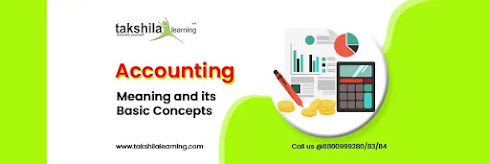The Basic Concepts of Accounting & Its Meaning- CA Foundation
Introduction
Accounting is the process of recording all of a person's or company's financial transactions. Then there are the procedures and guidelines that govern how a transaction should be recorded. Debit and credit, revenue and expenditure, asset and liability are all examples of this distinction. Then there are regulations about whether it is a benefit or a cost, and so forth.
The economic unit is treated as a legal entity in its own right. It's a method of keeping track of a company's financial transactions. Analyzing transactions for regulators and agencies is part of the accounting process. Accounting can make use of financial statements. These statements list all of the monetary transactions that occurred within a given accounting period.
How Accounting Works?
Accounting is one of the most important aspects of almost any company. It is increasingly being handled by a bookkeeper or accountant at a small business, or by big finance departments with hundreds of staff at larger businesses. Accounting reports are generated by several streams of accounting, such as accountancy and managerial accounting, and these reports are extremely useful in assisting management in making educated business decisions.
The different types of Accounting?
i. Financial Accounting: Financial accounting refers to the processes used to generate interim and annual financial statements. For some, like publicly traded companies, audits are a legal requirement. However, lenders need the results of an annual external audit for their debt covenants.
ii. Managerial Accounting: Managerial accounting uses the same data as that of financial accounting, but that data is utilized and organized in various ways. Essentially, any information which can be useful to management falls underneath this umbrella.
iii. Cost Accounting: whilst managerial accounting helps businesses make decisions about management, accountancy helps businesses make decisions about costing. Essentially, accountancy considers all of the costs related to producing a product. Analysts, managers, business owners, and accountants use this information to figure out what their products should cost. In accountancy, money is cast as an economic belief production, whereas, in financial accounting, money is taken under consideration to be a measure of a company’s economic performance.
The essential accounting concepts?
Accruals concept: Expenses are recognized when assets are consumed and revenue is recognized when earned. This concept means a business may recognize revenue, profits, and losses in amounts that change from what would be recognized supported by the cash received from customers or when cash is paid to suppliers and employees. Auditors certify the financial statements of a business.
Conservatism concept: Revenue is simply recognized when there’s an inexpensive certainty that it will be realized, whereas expenses are recognized sooner when there’s an inexpensive possibility that they are getting to be incurred. This concept tends to finish in additional conservative financial statements.
Consistency concept: A business should continue using it on a go-forward basis once it chooses to utilize a specific accounting method as financial statements that are prepared in multiple periods are reliably compared often.
To read more about the essential accounting concepts Economic entity concept, Going concern concept, Matching concept, and Materiality concept. Or learn more about Basic Concepts of Accounting & It’s Meaning- CA Foundation
Here, at Takshila Learning, we offer CA/ CMA Foundation Online Classes via CMA Foundation Video Lectures and Online Tuition Classes. Now prepare for CMA Foundation Exam with us right from your home. Call Us @ 8800999280/83/84 and Book A Demo Now

Comments
Post a Comment
Thank you we will contact ASAP.